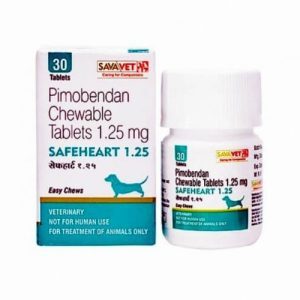Table of Contents
Safeheart (Pimobendan) is a veterinary medication designed to address congestive heart failure in dogs, regardless of its severity, whether mild, moderate, or severe. It is a suitable treatment for dogs experiencing heart failure due to conditions such as atrioventricular valvular insufficiency or dilated cardiomyopathy.

What Is Safeheart (Pimobendan)?
Safeheart (Pimobendan) is prescribed to manage the symptoms of congestive heart failure in dogs, including mild, moderate, or severe cases (modified NYHA Class IIa, IIIb, or IVc) attributed to atrioventricular valvular insufficiency (AVVI) or dilated cardiomyopathy (DCM).
Safeheart is recommended for use alongside concurrent therapies for congestive heart failure, such as furosemide, as deemed suitable for each case.
Dogs with modified New York Heart Association (NYHA) Class II heart failure may exhibit fatigue, shortness of breath, coughing, and other symptoms when engaged in activities beyond their usual level of exercise.
Dogs classified as having modified NYHA Class III heart failure tend to be comfortable at rest, but their ability to engage in physical activity is significantly reduced.
For dogs diagnosed with modified NYHA Class IV heart failure, any capacity for exercise is non-existent, and they display severe clinical signs even at rest.
Ingredients
Pimobendan is the active ingredient in Safeheart, a crucial component responsible for effectively managing congestive heart failure in dogs. This medication enhances the heart’s pumping ability, which is particularly important in atrioventricular valvular insufficiency (AVVI) and dilated cardiomyopathy (DCM).
Pimobendan acts as a positive inotrope, strengthening the heart’s contractions. This improves cardiac output and helps the heart pump blood more efficiently. Pimobendan also has vasodilatory effects, which relaxes blood vessels, reducing the heart’s workload and improving overall circulation.
Safeheart, with Pimobendan as its active ingredient, is a valuable tool in managing congestive heart failure in dogs, offering hope and improved quality of life to canine companions affected by these conditions.
Dosage Sizes
Safeheart should be given orally, with a total daily dosage of 0.23 mg per pound (0.5 mg per kilogram) of the dog’s body weight. You can achieve this by using whole or half tablets in an appropriate combination.
The daily dose should be split into two unequal portions, administered approximately 12 hours apart, typically in the morning and evening. The tablets have score lines, allowing you to provide the calculated dosage to the nearest half-tablet increment for precise administration.
| Dog’s Weight (lbs) | Dog’s Weight (kg) | Total Daily Dose (mg) | Morning Dose (mg) | Evening Dose (mg) | Whole Tablets |
| 5 | 2.27 | 1.15 | 0.5 | 0.65 | 1 |
| 10 | 4.54 | 2.27 | 1.0 | 1.27 | 2 |
| 15 | 6.81 | 3.08 | 1.5 | 1.58 | 3 |
| 20 | 9.07 | 4.14 | 2.0 | 2.14 | 4 |
| 25 | 11.34 | 5.17 | 2.5 | 2.67 | 5 |
| 30 | 13.61 | 6.23 | 3.0 | 3.23 | 6 |
| 35 | 15.88 | 7.27 | 3.5 | 3.77 | 7 |
| 40 | 18.14 | 8.32 | 4.0 | 4.32 | 8 |
| 45 | 20.41 | 9.36 | 4.5 | 4.86 | 9 |
Important Safety Information for Pet Owners
Safeheart is a prescription medication and should only be used under the guidance and supervision of a licensed veterinarian. Do not administer this medication to your dog without a proper veterinary prescription.
Ensure you administer Safeheart according to your veterinarian’s instructions and the prescribed dosage based on your dog’s weight. Use the provided score lines on the tablet to accurately divide the dosage into whole or half tablets.
Dogs receiving Safeheart therapy should undergo regular veterinary check-ups to monitor their overall health, cardiac function, and response to the medication. Discuss any concerns or changes in your dog’s condition with your veterinarian promptly.
Like all medications, Safeheart may have potential side effects. Common side effects may include loss of appetite, vomiting, diarrhea, or, in rare cases, lethargy and arrhythmias. Contact your veterinarian if you notice any adverse reactions in your dog.
Inform your veterinarian about any other medications or supplements your dog is taking. Safeheart may interact with certain drugs, and your veterinarian must consider potential drug interactions when prescribing this medication.
It is crucial to follow up with your veterinarian as recommended to assess your dog’s progress and adjust the treatment plan as needed. Compliance with the prescribed treatment schedule is essential for the effectiveness of Safeheart.
Safeheart is intended for canine use only and should never be administered to humans. In case of accidental ingestion or adverse reactions, immediately contact your veterinarian or an emergency pet poison hotline.
Veterinary Prescription
Safeheart (Pimobendan) is a prescription medication for dogs to manage congestive heart failure. In most countries, including the United States and many others, you typically need a prescription from a licensed veterinarian to purchase Safeheart. Veterinarians prescribe this medication based on thoroughly evaluating your dog’s condition and specific needs.
Contraindications
Safeheart should not be administered in instances of hypertrophic cardiomyopathy, aortic stenosis, or any other clinical condition where an increase in cardiac output is unsuitable due to functional or anatomical reasons.
Interactions
Safeheart can be safely used in dogs concurrently receiving a range of medications and treatments, including but not limited to furosemide, digoxin, enalapril, atenolol, spironolactone, nitroglycerin, hydralazine, diltiazem, antiparasitic products (including heartworm prevention), antibiotics (such as metronidazole, cephalexin, amoxicillin-clavulanate, fluoroquinolones), topical ophthalmic and otic products, famotidine, theophylline, levothyroxine sodium, diphenhydramine, hydrocodone, metoclopramide, butorphanol, and in dogs following sodium-restricted diets.

Side Effects
Safeheart (Pimobendan) is generally well-tolerated in dogs when used as directed by a veterinarian. However, like any medication, it can sometimes cause side effects. Here are some possible side effects associated with the use of Safeheart:
- Gastrointestinal Disturbances: Some dogs may experience mild gastrointestinal upset, including nausea, vomiting, or diarrhea when taking Safeheart. These symptoms are usually temporary and can often be managed by administering the medication with food.
- Lethargy: In rare cases, dogs may exhibit lethargy or increased fatigue. If your dog appears excessively tired or weak, consult your veterinarian.
- Loss of Appetite: A decreased appetite can occasionally occur in dogs on Safeheart. If your dog refuses to eat, consult your veterinarian for guidance.
- Arrhythmias: While rare, some dogs may experience arrhythmias (irregular heart rhythms) when taking Pimobendan. Monitoring your dog’s heart rate and rhythm during treatment is essential, and any irregularities should be reported to your veterinarian promptly.
- Allergic Reactions: Although uncommon, allergic reactions, such as itching, hives, facial swelling, or difficulty breathing, can occur. Seek immediate veterinary attention if you suspect an allergic reaction.
- Excessive Urination and Thirst: In some cases, Safeheart can lead to increased urination and thirst. This is more commonly associated with concurrent diuretic use (e.g., furosemide) and should be monitored by your veterinarian.
- Other Uncommon Side Effects: Rarely, dogs may experience other side effects such as coughing, labored breathing, or restlessness. If you notice any unusual or severe symptoms, consult your veterinarian.
It’s essential to follow your veterinarian’s guidance and closely monitor your dog while they are on Safeheart. Any concerning or persistent side effects should be reported to your veterinarian promptly.
Overdose
An overdose of Safeheart (Pimobendan) can be a severe and potentially life-threatening situation for your dog. If you suspect that your dog has ingested an excessive amount of Safeheart or if you notice any signs of overdose, it is crucial to seek immediate veterinary assistance. Here are some potential symptoms of an overdose:
- Your dog may become extremely weak, lethargic, or unresponsive.
- Your dog may pant excessively and have difficulty breathing.
- An overdose may lead to severe irregularities in your dog’s heart rhythm, which can be dangerous.
- Your dog may vomit, which can further worsen their condition if the medication has not been absorbed completely.
- An overdose can affect your dog’s coordination and balance, leading to stumbling or falling.
- In severe cases, an overdose of Pimobendan can trigger seizures.
- In extreme cases, an overdose can lead to collapse or unconsciousness.
Call your veterinarian immediately if you suspect an overdose, or take your dog to the nearest emergency veterinary clinic. Inform the veterinary staff about the medication your dog ingested, the dosage, and the time of ingestion if known. Do not attempt to induce vomiting at home unless specifically instructed to do so by a veterinarian. Keep your dog calm and quiet while seeking immediate professional help.
Storage
Store Safeheart in its original packaging or container to ensure you have the correct medication and dosage information readily available. Keep Safeheart in a cool, dry place, away from direct sunlight and moisture. Do not store it in a bathroom or anywhere with high humidity. Typically, Safeheart should be stored at room temperature unless otherwise specified by the manufacturer.
Store Safeheart in a location that is inaccessible to pets and children. Consider using a secure medicine cabinet or a high shelf.
Ensure the medication container is tightly sealed to prevent air and moisture from getting inside.
Do not transfer Safeheart to another container unless instructed to do so by your pharmacist or veterinarian. The original packaging is designed to protect the medication.
Always check the expiration date on the medication packaging. Do not use Safeheart if it has expired.
If you have unused or expired Safeheart, dispose of it properly, following local regulations. Do not flush medications down the toilet or throw them in the trash. Consult your veterinarian or a local pharmacy for guidance on safe disposal.
Store Safeheart separately from other medications to prevent mix-ups.
FAQ
How does Safeheart work to treat congestive heart failure in dogs?
Safeheart is a positive inotrope, which means it strengthens the heart’s contractions, improving its pumping ability. It also has vasodilatory effects, reducing the workload on the heart and improving circulation.
Can Safeheart be used in dogs of all sizes and breeds?
Safeheart can be used in dogs of various sizes and breeds. However, your veterinarian should determine the dosage based on your dog’s needs and weight.
Can my dog take other medications alongside Safeheart?
Safeheart can often be used safely with other medications, such as diuretics, antibiotics, or heartworm prevention. Your veterinarian will determine the appropriate combination of treatments.
Can Safeheart be given to pregnant or nursing dogs?
Safeheart should be used with caution in pregnant or nursing dogs. Please consult your veterinarian for guidance on its use in these situations.
What should I do if I miss a dose of Safeheart for my dog?
If you miss a dose, administer it as soon as you remember. However, if it’s close to the time for the next dose, skip the missed dose and resume the regular dosing schedule. Do not double the dose.
Are there any contraindications for using Safeheart in dogs?
Yes, Safeheart should not be used in dogs with hypertrophic cardiomyopathy, aortic stenosis, or any clinical condition where increased cardiac output is inappropriate for functional or anatomical reasons. Always consult your veterinarian to assess your dog’s suitability for Safeheart.

































